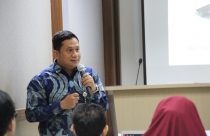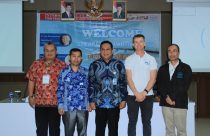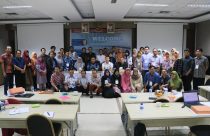RIIFE SYNERGIZE WITH SEAFDEC/IFRDMD HOLD INTERNATIONAL CLASS “FISH PASSAGE ON INLAND FISHERIES”
Inland fishery is one of the important components on economies and its contributions in rural communities are particularly important in poverty alleviation, food security and nutritional well-being. The sustainability of inland capture fisheries much depends on the quality of aquatic habitats and ecosystems. Fish migration and aquatic habitat connectivity can be limited by natural barriers such as waterfalls, cascades, rapids and riffles, and anthropogenic barriers such as dams, weirs and road crossings (Thorstad et al., 2008). Barriers which are only passable during favourable hydrological conditions can cause delays during fish migration, potentially constraining reproduction to periods or locations with sub-optimal environmental conditions (Ovidio and Philippart, 2002). Therefore, a solution is needed to solve the problem.
 Based on the issue, Research Institute for Inland and Fisheries Extension (RIIFe) synergize with SEAFDEC/IFRDMD held an International Class with the theme of Fish Passage on Inland Fisheries. The event was held on July 3rd, 2018 in Hall of RIIFe, Jakabaring, Palembang. It was officially opened by the Chief of SEAFDEC/IFRDMD and Head of RIIFe, Dr. Arif Wibowo, S.P., M.Si. In his speech, he said that fish passage is important for the sustainability of inland capture fisheries.
Based on the issue, Research Institute for Inland and Fisheries Extension (RIIFe) synergize with SEAFDEC/IFRDMD held an International Class with the theme of Fish Passage on Inland Fisheries. The event was held on July 3rd, 2018 in Hall of RIIFe, Jakabaring, Palembang. It was officially opened by the Chief of SEAFDEC/IFRDMD and Head of RIIFe, Dr. Arif Wibowo, S.P., M.Si. In his speech, he said that fish passage is important for the sustainability of inland capture fisheries.
On that occasion, Dr. Lee Baumgartner, a researcher from Charles Sturt University (CSU) explained about fish passage and the construction. Other speaker is Prof. Dr. Muhayatun Santoso, M.T., a researcher of the national nuclear power agency (BATAN). She explained about the potential marker for fish migration.
Through this international class, it is expected that all stakeholders can understand about fish passage and know that the fish passage is one of alternatives to increase fish resources. #DPA


